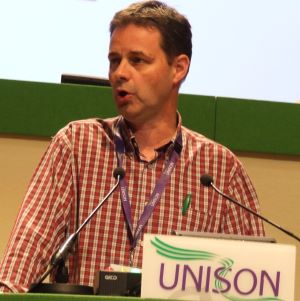Resources to support devolution

|
Stephen Smellie
|
|
|
Gordon McKay |
Gray Allan |
Devolution took centre stage at National
Conference, as delegates agreed a call from Scotland
to review the
devolution protocols and recognised the need to support
devolved bargaining with additional resources and appropriate
procedures.
Crucially, it also agreed support for UNISON in Scotland
to engage members in the constitutional debate to ensure
the union reflects the views of Scottish members.
Moving the motion, Stephen Smellie, Scotland Regional
delegate pointed out that devolution has resulted in
different policies and laws in the four nations. UNISON’s
devolution protocols were created to ensure that we were
able to adapt to this in each country and represent our
members effectively in separate bargaining arrangements
and with separate parliaments – dealing with different
issues, media and expectations. The SNP government’s
independence referendum poses new challenges.
“We are clear about the kind of Scotland we want – more
equal, fairer, full employment, properly funded public
services, no nuclear weapons – the same as the
rest of you. The question for us is will independence
or the status quo or more devolution short of independence
make it more likely we will achieve our vision.”
It was not about where the political power is held – Edinburgh
or London – but what the politicians will do with
that power, and how it will make a difference to our
security of employment or our children’s future.
“We are determined that this debate needs to be
brought to our people and must address the issues of
our members and how we look after our people, and not
just about a flag or powers for politicians,” said
Stephen, calling for resources to ensure the full engagement
of members.
Gordon McKay, for the NEC warned that devolution has
moved on and the union needed to move with it.
“The principle of devolution is about being closer
to the people we represent, but the practice of devolution
should be about ensuring that the powers that go with
it are used for the benefit of our members.”
It was important that campaigning, bargaining and decision
making were made at the appropriate place and where our
members relate to – sometimes that will be the
UK and sometimes the devolved nations.
“The commitment from the NEC is not just to review
funding and procedures, but that increased funding will
be made available and all our procedures will support
devolved bargaining,” promised Gordon.
He added that the NEC and the UK union will not walk
away from the constitutional debate in Scotland “as
the outcome will affect all of our members, not just
in Scotland, but that debate will be led by UNISON Scotland
and the final decisions will be that of our members.”
Falkirk’s Gray Allan welcomed the motion but warned
that the constitutional debate was a complex issue, loaded
down with history and laced with sentiment and we needed
to be ice cold in considering the only question that
mattered, “Where do the interests of our members
and of all working people lie?”
He told conference that the interests of our members
across all the nations in the UK are the same – that
what unites us is the common history of our movement.
“Putting football and rugby aside, between public
service workers across the UK there can be no barriers,
no boundaries and no divides,” said Gray.
top



